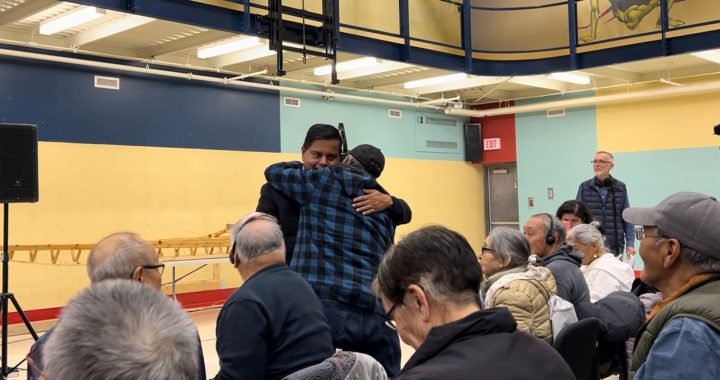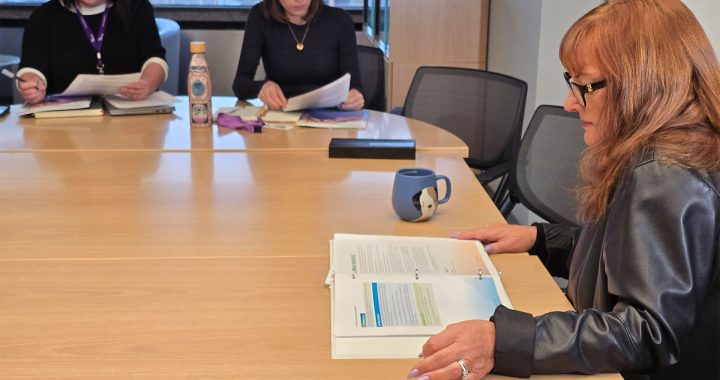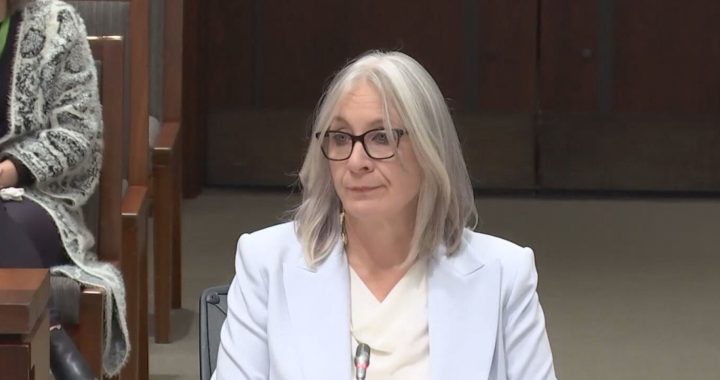Duncan puts money on the table, pushes ahead with First Nations education legislation despite treaty chiefs' objection
Aboriginal Affairs Minister John Duncan said Thursday the Harper government would be putting money on the table to go along with contentious plans for new legislation governing First Nations education.
APTN National News
OTTAWA–Aboriginal Affairs Minister John Duncan said Thursday the Harper government would be putting money on the table to go along with contentious plans for new legislation governing First Nations education.
Duncan issued a statement following a late afternoon meeting with Assembly of First Nations National Chief Shawn Atleo and three other chiefs, including Nova Scotia and Newfoundland and Labrador regional Chief Morley Googoo.
Duncan said the Harper government would meet its obligation to consult under the Constitution.
“Our approach will be consistent with our obligations … and will include intensive consultation with First Nation parents, students, leaders and educators, as well as provinces,” said Duncan’s statement. “We will also explore mechanisms to ensure stable, predictable and sustainable funding for First Nation education.”
The Harper government’s plan to pass legislation that would provide a framework for on-reserve, K-12 education is one among several of the irritants that led Saskatchewan, Manitoba and Ontario chiefs to try and enter the House of Commons Chamber on Tuesday.
Duncan told the chiefs he had a cabinet mandate directing him to proceed and begin consultation on new legislation.
The Atleo-led delegation told the minister that issues of treaty rights and funding needed to be addressed. The two sides agreed to meet again in the New Year.
“All issues were put squarely on the table and we will follow-up by transmitting the resolutions along with our national action plan once it is confirmed by us,” said Googoo in an email sent to chiefs and band officials at about 6:35 p.m. following the meeting. “Key issues included the urgent need for fair, equitable and stable funding, regional diversity including the absolute need for respectful implementation of our rights and Treaty implementation and support for First Nations controlled systems supportive of our languages and cultures.”
The meeting began sometime between 4 p.m. and 4:30 p.m., moments after Atleo’s speech to wrap up a special chiefs assembly when he declared “now was the time for action.” Its time was set while chiefs were still gathered in the assembly.
The AFN’s chiefs committee on education had sent a letter to Duncan last week requesting the meeting.
There were some questions immediately after the AFN and the minister issued their statements as to why Duncan didn’t meet with all the chiefs at the assembly.
Treaty chiefs from Saskatchewan, Manitoba and Ontario have said federal education legislation would infringe on their constitutionally-protected treaty right to enact sovereign laws over how they teach their children.
The Federation of Saskatchewan Indian Nations distributed a pamphlet with a stark warning about Ottawa’s plans.
“The last time Canada introduced federal legislation in education for our people,” says the pamphlet above two photos of Cree child Thomas Moore before and after he entered an Indian residential school in Regina. In one photo Moore has his long hair in braids and wears traditional beaded clothing and in the next photo his hair is trimmed short and he wears a tight fitting suit.
The FSIN has passed three resolutions demanding the AFN stop working with Ottawa to develop federal education legislation.
Under then-Aboriginal Affairs Minister Jim Prentice, a minority Harper government passed B.C. specific legislation in late 2006 that allowed for harmonization between provincial and on-reserve education systems.
Treaty chiefs don’t want provinces at the table.










We have run a long way from where we started. There has been many thing that happened along that run. The Natives are unable to trust. Can we blame them? The truth of the matter is that funding has been long sine capped. First Nations have been struggling with a two percent increase yearly. While over fifty percent of our population is under twenty-five. This growing population has growing needs. When we were young anyone that wanted an education could get one. We need to do whatever we can to help these kids.
I find it strange they would make the distinction to consult “under the Constitution”.
o.0
ANYWAY now that Harper is waving a cheque in the Chiefs’ faces, things will simmer down again.
“Now is the time for action,” says Atleo…w/e.
Treaty 6 Elected Chiefs need to read the letter of the Agreement as it was signed by Heirditary Chiefs whom signed this Sacred Agreement, to last as long as the sun shines and rivers flows and the grass grows. This sacred agreement cannot be altered by Ledgislative Bodies that do not understand it’s implications if this document is altered as it was signed between two Nations. This agreement was signed between the Queen and First Nation Chief whom together created lasting Peace and Harmony. Held in the sacred document is an understanding that our two great nations are bound and obligated to each other. Land was never the issue and it was never signed or leased or given as a gift to the Queen but what was said is that what was allowed was 6 inches of top soil was allowed for planting crops. Treaty 6 Heirditary Chiefs still believe this to be as it was signed in 1876 as it is today and if there are changes added later was never a question. Many of these promises have been broken by federal and provincal ledgislative bodies whom inacted there own views which go against this sacred document.
Duncan said the Harper government would meet its obligation to consult under the Constitution. Hahahahahahahahahahahahahahahahah (slaps knee then shakes head)